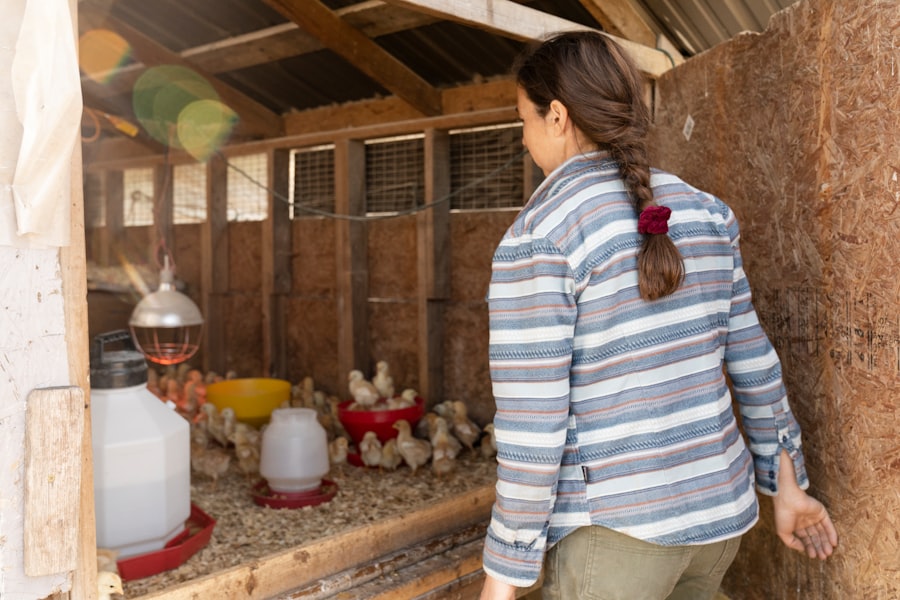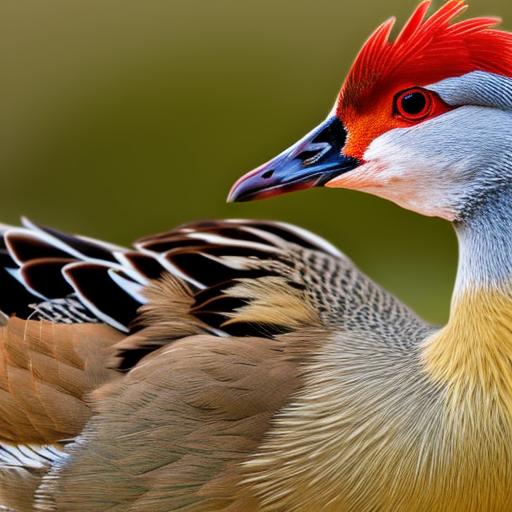Keeping geese and chickens together can be a rewarding experience for poultry enthusiasts. Both geese and chickens are popular choices for backyard farming, and when kept together, they can complement each other in various ways. Geese are known for their excellent foraging abilities and can help keep pests at bay, while chickens are prolific egg layers and can provide a valuable source of protein. However, keeping geese and chickens together also requires careful planning and management to ensure the well-being of both species. In this article, we will explore the various aspects of keeping geese and chickens together, including understanding their differences, creating a suitable living environment, managing social dynamics, providing proper nutrition, addressing health considerations, and final considerations for successful cohabitation.
Key Takeaways
- Keeping geese and chickens together can be a rewarding and beneficial experience for both birds and their owners.
- Geese and chickens have different social behaviors, communication styles, and space requirements that need to be understood and accommodated.
- Providing a suitable living environment for geese and chickens involves creating separate areas for nesting, feeding, and resting, as well as ensuring access to water and protection from predators.
- Managing the social dynamics between geese and chickens requires careful observation and intervention to prevent aggression and ensure peaceful cohabitation.
- Proper nutrition for geese and chickens involves offering a balanced diet that includes grains, greens, and protein sources, as well as providing access to grit and calcium supplements.
Understanding the Differences Between Geese and Chickens
Geese and chickens are two distinct species with different behaviors, dietary needs, and social structures. Geese are larger and more territorial than chickens, and they have a strong flock mentality. They are also known for their loud honking and aggressive behavior, especially during the breeding season. Chickens, on the other hand, are smaller and more social animals that thrive in flocks. They have a pecking order within their group, which can lead to bullying and aggression if not managed properly. Understanding these differences is crucial when keeping geese and chickens together, as it will help in creating a harmonious living environment for both species. It’s important to provide enough space for both geese and chickens to roam freely without feeling crowded or threatened by each other. Additionally, providing separate areas for nesting and roosting can help minimize conflicts between the two species.
Creating a Suitable Living Environment for Geese and Chickens
When keeping geese and chickens together, it’s essential to create a suitable living environment that meets the needs of both species. Geese require access to water for bathing and drinking, so providing a pond or shallow pool is ideal for them. Chickens also benefit from having access to clean water for drinking and dust bathing areas for grooming. Both geese and chickens need shelter from predators and the elements, so providing secure coops or shelters is essential. It’s important to ensure that the living environment is spacious enough to accommodate the natural behaviors of both species, such as foraging, nesting, and roosting. Additionally, providing ample vegetation and natural cover can help create a more enriching environment for geese and chickens to explore and thrive in.
Managing the Social Dynamics Between Geese and Chickens
Managing the social dynamics between geese and chickens is crucial for maintaining a peaceful cohabitation. Geese are known for their protective nature, especially during the breeding season, so it’s important to introduce them to chickens gradually to minimize any aggressive behavior. Providing enough space for both species to establish their territories can also help reduce conflicts. Additionally, observing their interactions and intervening when necessary can help prevent bullying or aggression between geese and chickens. It’s also important to provide separate feeding areas to ensure that both species have access to their respective diets without competition. By understanding the social dynamics of geese and chickens, poultry enthusiasts can create a harmonious living environment where both species can coexist peacefully.
Providing Proper Nutrition for Geese and Chickens
Providing proper nutrition is essential for the health and well-being of geese and chickens when kept together. Geese are primarily herbivores and require a diet rich in grass, leafy greens, and grains. They also benefit from access to water for bathing and grazing on aquatic plants. Chickens, on the other hand, are omnivores and require a diet that includes a balance of grains, seeds, insects, and kitchen scraps. It’s important to provide separate feeding areas for geese and chickens to ensure that they have access to their specific dietary needs without competition. Additionally, supplementing their diets with calcium for egg production and grit for digestion can help meet their nutritional requirements. Providing access to fresh water at all times is also crucial for both geese and chickens to stay hydrated and healthy.
Health Considerations for Keeping Geese and Chickens Together

When keeping geese and chickens together, it’s important to consider the health implications of cohabitation. Geese are generally hardy birds but can be susceptible to certain diseases such as avian influenza and botulism. Chickens are also prone to various health issues such as respiratory infections, parasites, and egg-related problems. To prevent the spread of diseases between geese and chickens, it’s important to practice good biosecurity measures such as regular cleaning of coops, quarantine of new birds, and monitoring for any signs of illness. Providing regular veterinary care and vaccinations can also help prevent common health issues in both geese and chickens. Additionally, ensuring that both species have access to clean water, nutritious food, and a suitable living environment can help promote overall health and well-being.
Conclusion and Final Considerations for Keeping Geese and Chickens Together
In conclusion, keeping geese and chickens together can be a rewarding experience for poultry enthusiasts when done thoughtfully and responsibly. Understanding the differences between geese and chickens, creating a suitable living environment, managing social dynamics, providing proper nutrition, and addressing health considerations are all essential aspects of successful cohabitation. By considering these factors and taking proactive measures to meet the needs of both species, poultry enthusiasts can create a harmonious living environment where geese and chickens can thrive together. It’s important to remember that each bird has its own unique requirements, behaviors, and social structures, so careful planning and management are key to ensuring the well-being of both geese and chickens when kept together. With proper care and attention, keeping geese and chickens together can be a fulfilling experience that allows both species to flourish in a shared environment.
If you’re considering keeping geese and chickens together, it’s important to understand the dynamics of managing different poultry species in the same environment. To further expand your knowledge on poultry care, you might find the article on “What Vegetables Do Quails Eat” from Poultry Wizard insightful. Understanding the dietary needs of various poultry species can help you create a harmonious living environment for your birds. Additionally, learning about the mating season for turkeys and exploring innovative coop designs like the Snaplock Chicken Coop can provide valuable insights into creating a well-rounded and sustainable poultry setup.
FAQs
Can I keep geese and chickens together?
Yes, it is possible to keep geese and chickens together in the same coop or living space.
What are the benefits of keeping geese and chickens together?
Keeping geese and chickens together can provide companionship for the animals, as well as potential protection from predators. Geese are known to be good guard animals and can help protect the chickens.
Are there any potential issues with keeping geese and chickens together?
One potential issue is that geese can be more aggressive than chickens, especially during mating season. It’s important to monitor their behavior and provide enough space for both species to avoid conflicts.
What should I consider when housing geese and chickens together?
When housing geese and chickens together, it’s important to provide enough space for both species to roam and forage. Additionally, ensuring that the coop is secure and predator-proof is essential for the safety of both geese and chickens.
Do geese and chickens have similar dietary needs?
Geese and chickens have similar dietary needs, as they both require a balanced diet of grains, greens, and protein. However, it’s important to provide separate feeding areas to ensure that each species gets the appropriate amount of food.
Meet Walter, the feathered-friend fanatic of Florida! Nestled in the sunshine state, Walter struts through life with his feathered companions, clucking his way to happiness. With a coop that’s fancier than a five-star hotel, he’s the Don Juan of the chicken world. When he’s not teaching his hens to do the cha-cha, you’ll find him in a heated debate with his prized rooster, Sir Clucks-a-Lot. Walter’s poultry passion is no yolk; he’s the sunny-side-up guy you never knew you needed in your flock of friends!







